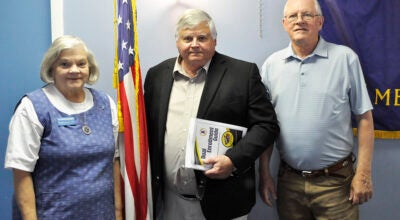Hospital business familiar territory
Published 12:00 am Saturday, January 16, 2010
The city of Troy was set to take over Troy Regional Medical Center first thing Friday, but that transition was a little delayed.
Beginning at 12:01 a.m. Saturday, ownership officially began.
Troy Mayor Jimmy Lunsford said there was nothing abnormal to cause the transition’s delays, but things simply moved slower than originally planned.
“It’s all a done deal,” he said.
While running a hospital is something the city of Troy officials say they don’t necessarily want to do, it’s certainly not something that’s unfamiliar.
In fact, until 1994, the city of Troy had been in the “hospital business” for 25 years.
Prior to 1969, there were two privately-owned hospitals that agreed to shut down, and the city built one of its own, Lunsford said. That was the start of Edge Regional Medical Center.
With restrictions on publicly-owned hospitals and millions accumulating in debt, Lunsford said it came time in 1994 to consider leaving that business behind.
“In those days, the public environment had a lot more restrictions,” Lunsford said. “It was impossible for a municipal-owned hospital to actually pay contracts to doctors. There was $8.8 million in debt at that time with about a three-fourths being paid each month out of the general fund.
“We felt like the private environment was a better option for health care here.”
On average, Lunsford said it was costing about $750,000 a year in taxpayer money to run the facility.
So, in 1994, Community Health Systems offered to purchase the hospital, and the city sold it for $22 million.
With that money, the city used a portion to pay off the remaining debt, and then it put the $14 million left into a trust fund that can’t be accessed without a two-thirds vote of the public.
Over time, the money has now accumulated to around $16 million.
As the city enters the health care business for the next go around, it’s not a position city officials hoped they’d find themselves in.
“Hospitals should be run by those who specialize in the health care industry. That was my feeling then, and it still is,” said Council President Johnny Witherington, who was a member of the council when the city owned and then sold the hospital.
During the first time the city owned the hospital, Witherington said the council and mayor had little to do with the actual operations of the hospital. A board was appointed by the council to oversee operations.
“We pretty much let them take care of it and didn’t have much involvement in it,” Witherington said.
The city’s established Health Care Authority will serve the same purpose now as that board did then.
“We will be there to govern the set policies,” said Sherrill Crowe, chairman of the Health Care Authority. “The administrator will be running the hospital.”
To make a comparison, Troy Regional Medical Center had previously been owned by the Troy Doctors Hospital, LLC., comprised of 14 local doctors and an investor Gil McKenzie. Those owners were the financers of the hospital, but they had appointed a Board of Managers to govern. That board oversaw operations, but the hospital CEO, chief financial officer and other managers actually ran the facility.
Under the city of Troy’s ownership, the structure will be similar, with Troy paying the money, the health care authority governing and administrators still keeping the day-to-day operations underway.
The difference, of course, is that it will be a publicly funded facility, rather than use private monies.
A 1-cent tax will be implemented in March to fund this endeavor, but Lunsford said he will bring the option of breaking into the trust fund before the city for a vote sometime within the year.
Even though the hospital was operating with debt the first time the city owned it, Lunsford said he believes this time will be different — or at least he hopes.
“We will make every effort to study the situation and make whatever changes necessary to run the hospital and to provide the best quality of care and minimize costs to the city,” Lunsford said.
How exactly the city plans to do that, Lunsford said he is unsure.
“We’re really in a crisis situation now trying to keep the doors open,” he said.
Witherington said he has some reservations as the city takes the keys to TRMC, but he thinks the option will work out for the city of Troy’s residents.
“I would have preferred we were not compelled to begin having to resume operating the hospital again. To this moment, I prefer the city not have to do what it did,” Witherington said. “It doesn’t please me the doctors group didn’t make it. They tried really hard. They were headed in the right direction. They simply didn’t have the capital they needed.”
So, with keys in hand, Lunsford said the city will resume the responsibility to keep the health care facility in Pike County.
“We’re going to focus like a laser beam. Maybe a potential buyer might express interest in our hospital,” he said. “Right now, we’re working on getting this transition taken care of and making sure health care provided is the best it can be.”
Aside from Crowe as chairman of the Health Care authority, Driskol Coquett serves as vice chair and Brenda Dubose as secretary.





